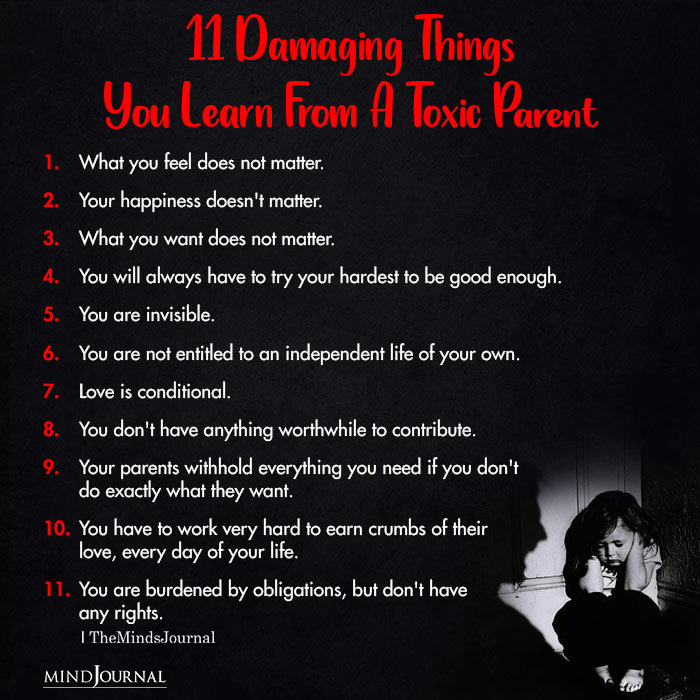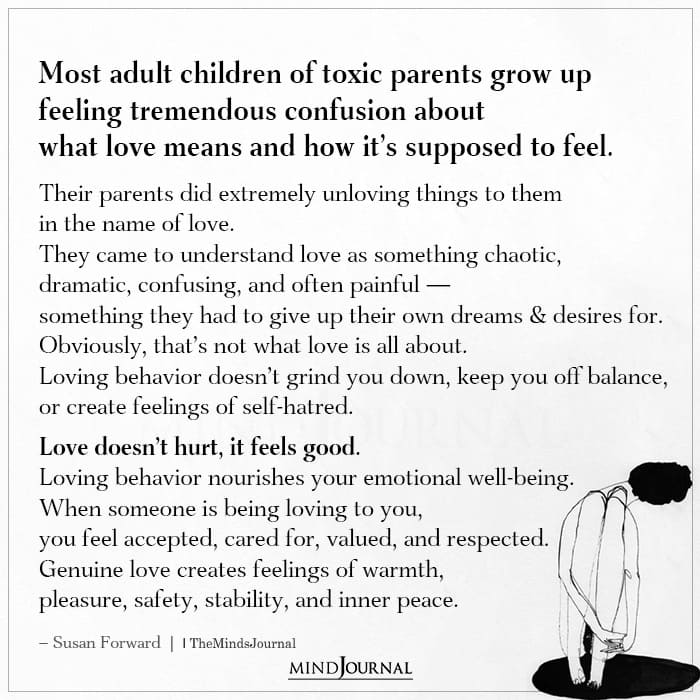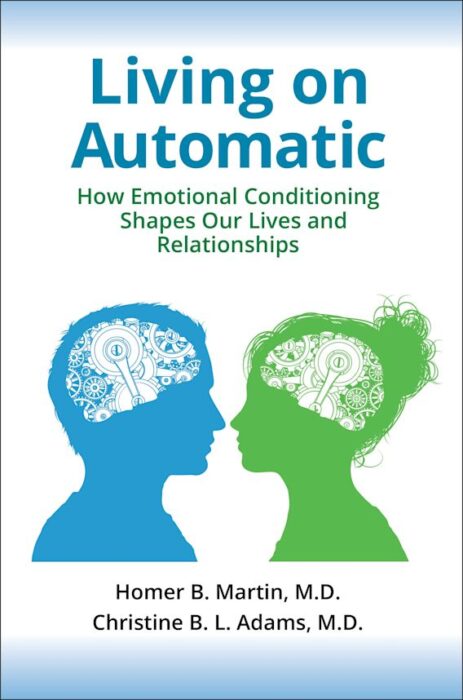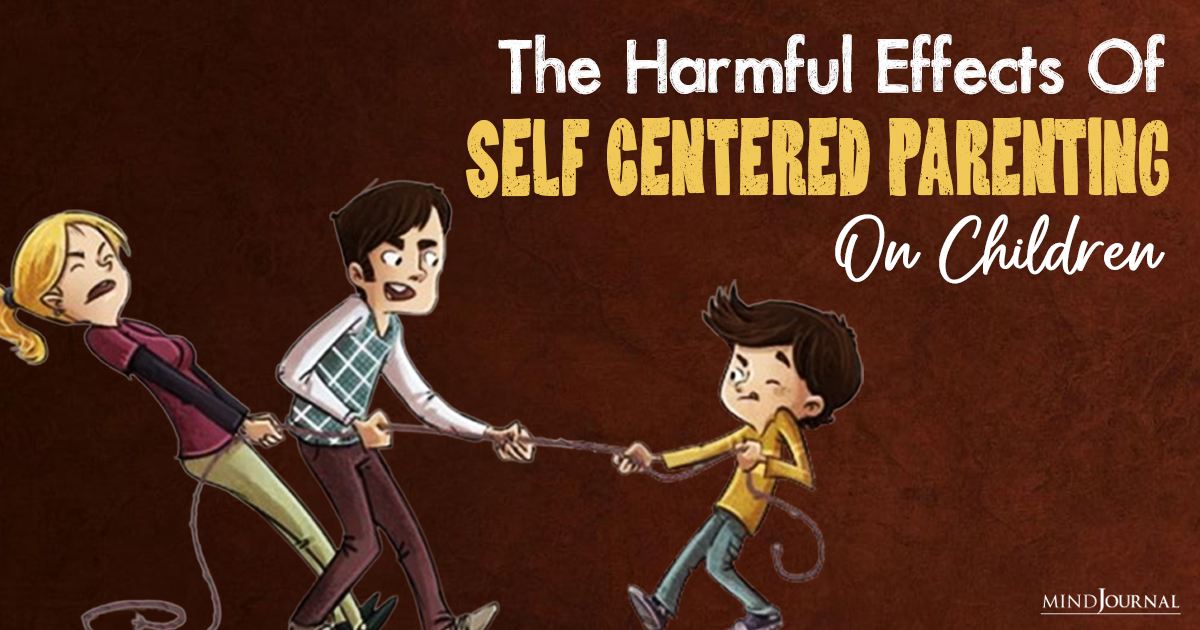When you are on the opposite side of self centered parenting, it can have far-reaching effects on you and your psyche. Growing up with selfish parents can take a heavy toll on your mental and emotional health, and these effects can be felt even when you are an adult.
KEY POINTS
- Self absorbed parents create role-reversed relationships with their children in which the child psychologically caters to the parent.
- Children show psychological responses to selfish parents depending upon the child’s personality.
- Some children acquiesce to self-focused parents’ demands, while other children are in open conflict with them.
Many children suffer grave emotional problems from living with a self absorbed parent. The child is disregarded and used as an extension of the parent. Often, this means the child’s physical wants and needs, points of view, and emotional needs go unmet.
Related: Children Of Narcissistic Parents: The Challenge of ‘Reparenting’ Yourself
The Role-Reversal Relationship
Everything revolves around the self absorbed parent. The relationship is one-sided and directed by the parent. Such a parent enlists the child in caring for and catering to him or her. This creates a role-reversal relationship that is inappropriate for the child’s growth, development, and welfare.
Self absorbed parents have many characteristics in the ways they relate with their children These relationship traits are well summarized by both Nina W. Brown, EdD, LPC, in Children of the Self-Absorbed and by Lindsay C. Gibson, PsyD. in Adult Children of Emotionally Immature Parents.
Such parents manipulate the child to ensure the spotlight of admiration stays on the parent. They lack empathy for the child’s emotional needs. They may show jealousy with any steps the child takes toward individuation––being his or her own person.

The Effects of Self Centered Parenting on Children
Children’s Emotional Responses
Children are affected by growing up with a self-focused parent. When a child is not related to as an individual, a separate person from a parent, there are many emotional and psychological consequences for the child.
When a child’s individuality is disregarded, it affects self-esteem and confidence. Low self-esteem in turn can create anxieties and depressions, suicidal thoughts, substance abuse, and runaway behaviours.
There are a wide variety of consequences children suffer in growing up with a selfish parent. Are there discernible patterns to their suffering? Homer B. Martin. M.D., and I found that there are.
Children respond to self-centered parents differently based on the child’s personality style. This style is created by how a child is emotionally conditioned within the family. We discovered personality styles form into two types––omnipotent and impotent.
Effects on Omnipotent Children
Omnipotent children try hard to satisfy selfish parents. The omnipotent label comes from the child’s unconscious belief that he or she is psychologically strong and able to fulfil the parent’s needs and requests, no matter how inappropriate. Such children are trained to be emotionally attuned to what the parent needs and wants. It’s a tall order and an impossible job for adults, much less a small child.
A child with an omnipotent personality acts as a complement to a self-focused parent. The omnipotent child will attempt to care for and meet a selfish parent’s needs and desires.
Since omnipotent children strive to do what Dad wants or be what Mom demands, they fall short. Selfish parents ask too much and are capricious, readily changing their demands. When these children fail to please selfish parents, they feel guilty, berate themselves, and lose self-esteem and confidence.
Omnipotent-role children feel anxious, get depressed, and believe they are of little value for failing the selfish parent’s demands. This puts them at risk for emotional illnesses of depression, academic failure, social withdrawal from friends, suicidal thoughts, substance abuse, and eating disorders.
Related: Identifying Toxic Parenting: 16 Types Of Toxic Parents, Signs And How To Deal
Effects on Impotent Children
The other emotionally conditioned role for children in families is the impotent role. These children are raised differently from omnipotent children.
Impotent refers to their unaware belief and actions of helplessness in their relationships. They are raised to be self-absorbed, like the self-centered parent. In this situation there are two peas in a pod. Parent and child are alike in personality.
An impotent parent and impotent child robustly compete with one another. Each wants to be the top dog in the relationship. Each wants his or her way. Young impotent children are often bullied by their selfish parent with put-downs and name-calling.
At other times they may be favored children, regarded by selfish parents as special. This happens because the parents project their own specialness and self-centered view onto the child. It is like looking in a mirror.
Older impotent children and teenagers bully and fight back with their impotent parent. This can create verbal and even physical conflict, as they both erupt with demands to gain their way in the relationship.
Impotent personality teens may run away from home, self-mutilate, abuse substances, or become involved in legal troubles. They are more likely to be outwardly volatile in their reactions to a self absorbed parent than are omnipotent personality children, who curtail their emotional reactions.

Difficulties Follow into Adult Life
Unfortunately, the effects of living with a self absorbed parent do not vanish at the end of childhood. As children grow to adulthood, they continue to relate to other selfish people the same way they were emotionally conditioned to do as a child.
We discovered that omnipotent personality children often marry self-focused mates. They focus on pleasing and caring for their partner. They neglect themselves in the relationship. Often, they walk on emotional eggshells, striving to never upset their mates.
Impotent children may form the same high-conflict relationships with other selfish people. They will always be in a contest to get their way in the relationship. They may have frequent emotional blow-ups and even physical altercations.
A Way Out
Hopefully, self-absorbed people will want to improve themselves before they become parents. They can do this by taking honest stock of their own emotional conditioning style.
How were you raised? Were you indulged and allowed to have your way a great deal? Did other family members give in to your requests, demands, or tantrums, no matter how unreasonable they were? Do you expect others to meet your desires and never thwart you?
Related: 5 Signs You Are The Child Of A Toxic Parent
If answers to these questions are positive for you, then you were likely raised in an impotent role. Your job before becoming a parent is to undo some of your emotional conditioning.
Seek out psychotherapy and work with a therapist. By so doing you can be prepared to raise your children in a reasonable way, listening to their needs and viewpoints and imposing judicious guidance and discipline. By undertaking the job of changing yourself, their childhoods will not be all about you.
Check out her website to see more blogs, podcasts and articles. Also, don’t forget to check out her amazing book, Living on Automatic: How Emotional Conditioning Shapes Our Lives and Relationships.

References:
Brown, N.B., (2020). Children of the Self-Absorbed: A Grown-Ups Guide to Getting Over Narcissistic Parents. Oakland, CA: New Harbinger Publications, Inc. Gibson, L.C., (2015). Adult Children of Emotionally Immature Parents: How To Heal from Distant, Rejecting, or Self-Involved Parents. Oakland, CA: New Harbinger Publications.
Written By Christine B. L. Adams M.D. Originally Appeared On Psychology Today










Leave a Reply